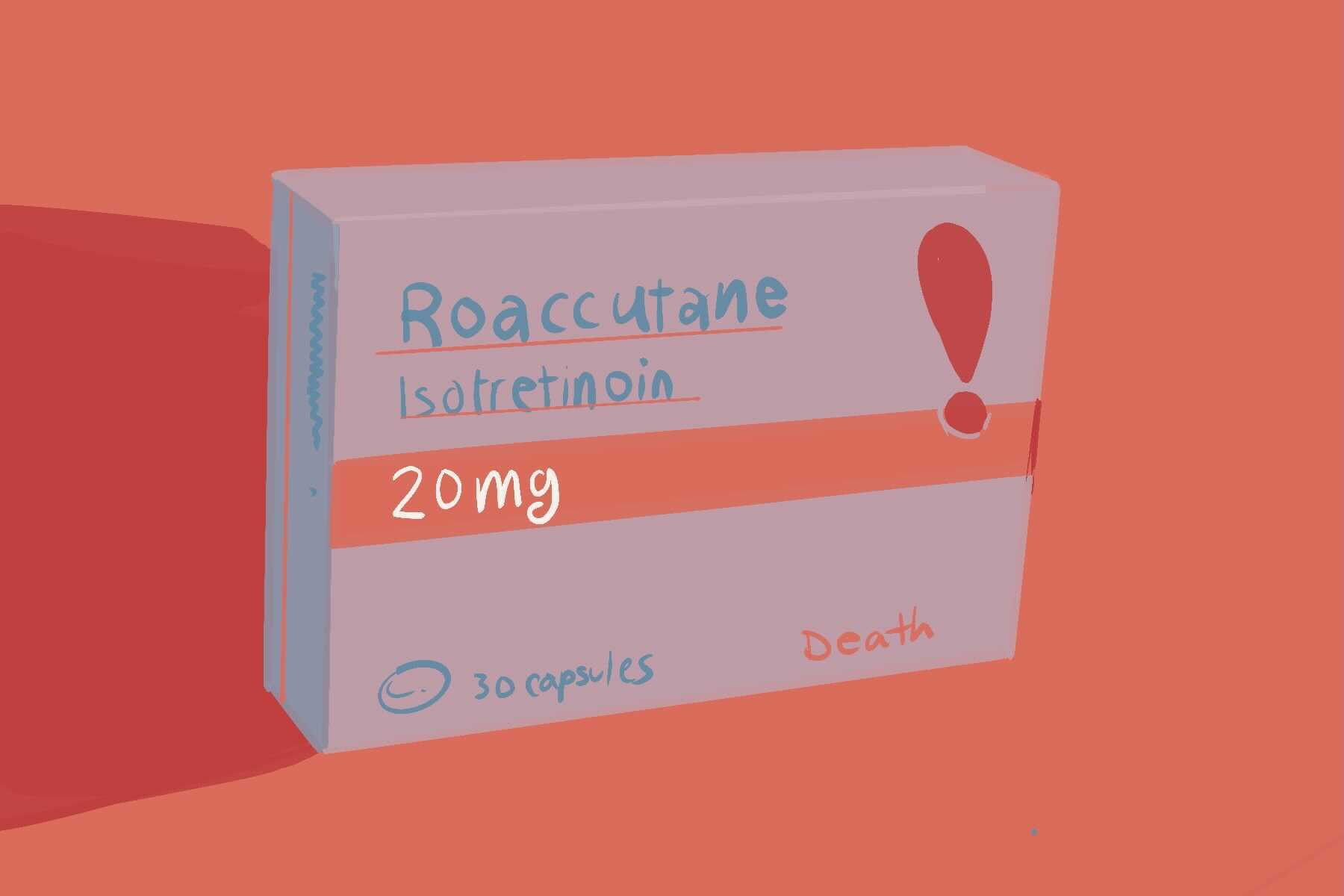Dealing with zits has been a reality for the majority of people at some point in life. From teenage acne to stubborn little spots that pop up the night before an important event, the struggle of achieving and maintaining clear skin is not new. Good genetics appears to keep some individuals free of blemishes for most of their lives, while others have to try all sorts of serums, soaps and sugar-free diets for any sort of reprieve — sometimes to no avail. If you’ve ever sought out professional help for skin care, odds are you’ve heard of the infamy of isotretinoin, or as it’s more commonly known in the U.S., Accutane.
The results of Accutane on even the most severe cases of acne appear promising, with people attaining beautifully clear skin sometimes within four or five months of treatment. For those who struggle with skin they’re not happy with, and the weight that can sometimes fall on self-esteem as a result, the drug looks like a magical “silver bullet.” But with a wide range of side effects and a pinch of controversy, is Accutane really worth it?
As someone who has been on an isotretinoin drug once for a year, and again now for another six months, my testimony might offer further insight into what life is like with the most vigorous acne treatment out there. Whether you’re looking to start, or if you’re in the middle of a round of treatment, it’s good to know what you’re getting into.
Although I’m getting ahead of myself: The first thing to note about Accutane is that it actually doesn’t exist anymore. The name Accutane is no longer sold in the U.S.; instead, the drug is exclusively sold under its generic names, such as Sotret and Claravis. If you’re unfamiliar with the differences between a brand-name drug and its generic, you can find more information here. The second thing to consider is that while many testimonies feature similar side effects and experiences, patients can still experience a diverse set of reactions. My testimony might not be the golden standard for how the next two people deal with their treatment, so ensure that you do a healthy amount of research on your own before you commit.
To give a small bit of background, isotretinoin is a vitamin A-derived compound used widely in dermatology to treat severe, persistent cystic acne. Cysts are not just a potential eyesore to a young person who already thinks their nose is too wide or their stomach isn’t flat enough (boo you, insecurities!), they’re also uncomfortable under the skin. No one’s biology completely spares them from ever getting a spot in their life because we all produce hormones called “androgens” that mess with the oil production on our faces. However, genetics can play an important role in determining how bad flare-ups become for a person — so don’t beat yourself up if you still experience bad breakouts even after trying all sorts of lotions, potions and Instagram “tricks.”
Sometimes professional intervention is required, which is where Accutane and its generics come in. The drug vigorously dries you out — not just the sebum glands on your face (which is how treatment halts and reverses acne), but also your lips, eyes, nose and the rest of the skin on your body. The drug’s side effects can be as much a burden as the acne itself, with nose bleeds, instant sunburn, CONSTANTLY chapped lips and sometimes even mental health problems like depression.
Perhaps the most emphasized side effect is that on fetal development: Dermatologists make it abundantly clear to female patients that contraception is non-negotiable during and for a bit after treatment because the drug has severe teratogenic side effects. In fact, the pharmaceutical company that produced the drug has put a strict program in place called “iPledge” to ensure that females who are pregnant or trying to get pregnant do not receive isotretinoin treatment.
An abundance of information is available on isotretinoin. If there’s one thing I would suggest to anyone who wants to try drug treatment, it would be to do research and consult their dermatologist about any and all concerns both before and during treatment. Additionally, choose a competent dermatologist when taking the drug — even if you have to switch doctors mid-treatment as I did.
Which brings me to my testimony: As a teenager, I don’t think I suffered from particularly bad skin. I can’t say it was the clearest, but I only started developing bad breakouts toward the end of high school and the first year and a half of college. I decided to ask a doctor for help when the weight on my self-image became too much to handle. The first doctor I went to was a bit of a cowboy, punting Oratane (the Accutane generic I was on) as this miraculous solution to all my skin care problems and prescribing a dose that was ultimately far too high.
It’s true that things get worse before they get better with isotretinoin, and for the first two months of treatment, I experienced the worst skin of my life. To say I was feeling delicate when I arrived in the office of the second dermatologist would be an understatement. However, in much more professionally competent hands, within the next three weeks my skin cleared up on a lower dose and an additional antibiotic.
Treatment went well for the following four months before my doctor gave me the go-ahead to taper my daily dose off to a maintenance dose twice a week for the next six months. Personally, having clear skin is the ultimate confidence booster, and despite needing to go on a second course to clear minor stress-induced flare-ups during my final year of college, my skin has never been the same. I find that this fact alone is the most important thing to stress: This drug is not a silver bullet, and my doctor erased any misconception I had that sounded even remotely like that. Nothing will ever make it so that you never have a bad skin day, even a hardy drug like Accutane. Stress, diet and other factors that lie just below the surface all contribute to how your skin acts up, but should you undergo isotretinoin treatment, chances are your skin will improve to some degree, even if you need a second round of treatment.
So then why call it “the worst drug on the planet”? Well, for starters, not everyone gets to reap the benefits: Unfortunately, some people don’t respond to isotretinoin treatment at all. On top of that, the side effects can really get the better of a person. Physical and mental manifestations require patience and, ultimately, a good support system when your own patience runs thin. Sometimes it’s not enough to tell yourself that even though things are worse now, they will get better. Feeling shy and insecure about yourself is never nice, no matter how transient the feeling is. So if you’re considering isotretinoin treatment, here are two very important things I recommend:
- Choose a good dermatologist: Find someone who patiently answers all your questions, handles your emotions with integrity and doesn’t belittle your fears. And, if the going really gets tough before it gets better, you trust them to recognize inadequate treatment and to know how to proceed.
- Be patient with yourself: You are human, and getting acne to any degree is part of the package. If you’re feeling upset with how your skin looks in those beginning few weeks of treatment, allow yourself to be emotional and keep in contact with your doctor so that regular updates can keep them informed of what’s going on as you proceed.
At the end of the day, skin texture is a natural thing, and triumphing over your insecurities without drug treatment is more achievable than you think. However, if you still feel like clearing your skin up is the confidence-booster you need to kickstart a self-love journey, make sure you do it in competent hands and you understand fully the extent of what treatment looks like.

















